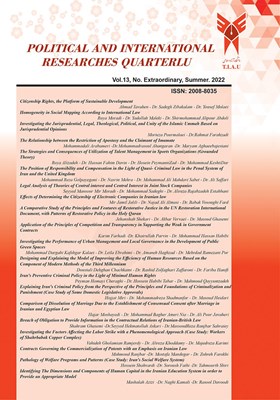The Relationship between the Restriction of Apostasy and the Claimant of Imamate
Subject Areas : Political and International Researches QuarterlyMohammadali Arabameri 1 , Mohammadrasoul Ahangaran 2 , Maryam Aghaeibajestani 3
1 - PhD student in Fiqh and Fundamentals of Islamic Law, Semnan Branch, Islamic Azad University, Semnan, Iran
2 - Professor, Department of Fiqh and Fundamentals of Islamic Law, University of Tehran, Farabi Campus, Tehran, Iran: Corresponding Author
3 - Associate Professor, Department of Fiqh and Fundamentals of Islamic Law, Semnan Branch, Islamic Azad University, Semnan, Iran
Keywords: Imamate, apostasy, Crime Claiming Mahdism, Claiming Mahdism, Claiming Imamate,
Abstract :
Based on strong intellectual and narrative evidence, Imamiyyah considers Imamate as a divine position and believes that belief in twelve Imams is generally one of the wisdoms of religion, and since Imamate is part of the principles of religion, the claim of Imamate contradicts this matter and it is apostasy from religion. This article is written in a library method. The main question is: what extent the legislator has considered for the claimants of Imamate? The main purpose is to determine the extent of apostasy for the claimants of Imamate with the opinion of the legislator. The main hypothesis is that the legislator has set a limit for the claimants of Imamate. Results show, citing cases such as the reasons for apostasy, the reasons for the necessity of enjoining the good and forbidding the evil, the reasons for the necessity of the rules of ta'zir, the claim of Mahdism faces punishment and the amount of this punishment depends on the scope of the plaintiff will have.
_||_


